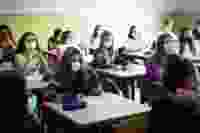
The National Education Union is not prioritising children
Unions can be a force for good, but when they grow too big, they can be incredibly harmful. The National Education Union has expressed concerns about the coronavirus spreading throughout schools. But, with children's education severely stunted from the first lockdown, increasing inequality, the NEU should not prevent schools staying open, writes Noel Yaxley.
Unions haven't always been bad. History has shown that unionised activity does, on occasion, have the potential to advance our working lives. My problem with unions is that they often wield an excessive amount of power over the government. Whilst holding the government to account is a good thing, this often ends by effectively holding the state to economic ransom.
Take the RMT – the union that represents the railways. Last year 796 unionised members voted to take industrial action leading to a 27 day strike on South Western Trains. The power wielded by this tiny minority caused an estimated £400 million loss to businesses. Citing health and safety reasons over the removal of a train-guard to open the doors – even though driver-only operation has been used safely since 1982. It ended in January and caused untold chaos and misery for thousands of commuters.
But unions can be a positive force, reinforcing worker's rights and defending us from threats to our cherished civil liberties, but grow too big and they can often do more harm than good.
Now we have the country's largest teaching union – with over 500,000 members – tilting at windmills over questionable 'health and safety reasons', effectively shutting down children's education.
A few days ago, it was reported that the Kingsway Primary School will close for six days over winter as industrial action has been agreed. Teachers have voted by more than 85 per cent for strike action which will see the school in Wallasey effectively shut down. The teachers who are represented by the National Education Union (NEU) are concerned with the coronavirus and potential outbreaks at the school.
During the first lockdown, the educational gap between the richest and poorest children in the country was blown apart. The future prospects from a lack of education have been severely hindered for children from a low-income family. It was estimated by the Education Endowment Foundation that keeping pupils out of school until September could reverse the almost decade-long progress made through the advancement of educational policies and widen the attainment gap between rich and poor children by as much as 36 per cent.
Online remote learning was the only option during the lockdown. But once again, the poorest children were hit the hardest – during the height of the pandemic just 3 per cent of state primary schools offered live streaming classes, whilst just 71 per cent of all state school pupils received less than an hours daily tuition. This, of course presupposes access to a computer and the internet. In contrast, a third of private schools were providing at least four hours of daily online learning for its pupils.
There is no doubt that lockdown has severely harmed the educational prospects of poorer children. According to the Index of Multiple Deprivation – which measures housing, crime and education to determine an area's level of poverty – the Wirral (where the Kingsway Primary School happens to be situated) is one of the poorest regions in England. And it is unfortunately these deprived areas that suffer the most. The National Foundation for Educational Research assessed the impact of the lockdown on education. They found that in the most economically disadvantaged areas, school teachers were over three times more likely to report pupils being four months or more behind in learning than less deprived schools.
The NEU has, since March, consistently called for schools to be closed due to the coronavirus, even though the government's own Sage advisors have never called for it themselves, saying that it "is still not clear to what extent (if any) schools magnify transmission in communities rather than reflect the prevalence within the community." Not that it seems to bother NEU General Secretary Dr. Mary Bousted who argues "we still don't know if it's safe for kids and teachers to return to schools. We need to think about the potential spread of the virus in the schools."
This is a serious illness, but only to a relatively elderly demographic who tend to have pre-existing health conditions. The virus has a mortality rate of 1 per cent: that's a 99 per cent survival rate. Of the 1.75 million cumulative Covid cases in the United Kingdom right now, 3.6 per cent have died. As for primary school-aged children? Well, between the ages of 5-9 there have been 1,796 potential Covid cases – 0.1 per cent. And to the best of my knowledge there has only been one death, a ten year old boy. Whilst every death is a tragedy, should we really be denying children an education when this equates to just 0.001 per cent of all known Covid deaths?
The Legatum Institute estimates that Covid has pushed over a quarter of a million people into 'deep poverty' – defined as 50 per cent below the poverty line. It is time the NEU put the poorest in society first. This can be done by allowing children to learn. There must be equality of opportunity in education. Everyone should have equal access to education. The NEU is preventing this.















